AudioCulture
The noisy library of New Zealand music
Te pātaka korihi o ngā puoro o Aotearoa
Six60
The mid 2000s were a particularly fertile time for local bands operating within bassy genre-busting paradigms. Building on the hard slog Salmonella Dub put in – touring the country, releasing records and making headway overseas, a second wave of bands including Fat Freddy's Drop, The Black Seeds, Shapeshifter, Katchafire and Kora had grafted their way into being the most visible live acts in New Zealand.
They were doing gold to multi-platinum sales figures, and pulling huge audiences up and down both the North and South Islands. In the space of eight or so years, these bands and their peers had gone from an underground countercultural force to dominating New Zealand's musical mainstream. At the same time, they were becoming a major influence on a certain facet of the new generation of local musicians.
The year was 2005, and Matiu Walters (vocals, guitar) and Ji Fraser (lead guitar) were living at the Unicol towers while studying in Dunedin. Both hobbyist musicians, they befriended Chris Mac (bass) while playing social rugby. At the time just flirting around with the idea of playing live music together, things crystallised for the boys when they attended a Kora concert at the university hall in 2008.
I interviewed Matiu Walters and Ji Fraser for the Oct/Nov 2011 issue of Rip It Up magazine – “Eli Manning was bouncing on the door,” Walters said, “So I called out to him and we managed to get ourselves backstage." While they were inside, they mentioned to the Kora brothers that they wanted to follow in their footsteps musically. Kora pointed out that Manning was a drummer and it was a wrap. "The next day we got together at our new flat, which was 660 Castle Street, and got jamming," Walters says.
Starting out playing covers of songs by the New Zealand bands who were inspiring them, they began writing their own music, and playing little performances at home for their friends. "We would play three tunes for everyone, and then go into town for cheap drinks," Walter reflects. Informed by the impact acts from the Aotearoa roots scene were having nationally, they filled a niche, providing a similar range of music at a cost their student peers could afford – free.
By the time they started playing real shows in Dunedin, they had cultivated an enthusiastic initial fan base.
As Fraser told Rip It Up, “That's the thing, [when you're a student] the little amounts of money you have are pretty preciously delegated, believe it or not … You have your beer, your booze, your food, and maybe your gig for the week. For us to be doing a free show for our mates, that was a good thing.”
Graduating from playing at home, they started performing at flat warmings, 21sts, and eventually clubs. As a result, by the time they started playing real shows in Dunedin, they had cultivated an enthusiastic initial fan base. With word of mouth about their sound spreading – after pressure from friends – in late 2008 they recorded an EP and released it independently in 2009.
Initially focused on playing live sets rooted in their take on reggae, funk and soul, for the EP they picked up a cheap Casiotone keyboard with, as Walters told Rip It Up, "… a good bass sound on it." Putting it to work, they added elements drawn from the genres of jungle/drum and bass and dubstep into their sound. With this addition came the arrival of a cover of 'Bring Change' by Shapeshifter as part their live set. Through performing it, Six60 attracted the attention and friendship of Marlon Gerbes, a synthesiser player who could see room for development in Six60's approach to electronica, and soon afterwards he joined the band.
After releasing handmade copies of their EP to friends and family, they capitalised on the enthusiastic response and began marketing their music through social media. Six60 set up a Facebook page, and Walter's mother's graphic design company made them a website. Online, the word of mouth buzz about what they were doing spread fast, leading to bookings around the country and the realisation they had a massive untapped market.
"I remember when we passed one thousand Facebook fans," Walters told Rip It Up – "We all got pissed to celebrate." It was simple really, as the students they'd entertained at house parties across Dunedin began to graduate and move to other parts of the country, they carried their excitement about and connection to Six60 with them, spreading an excitement that would soon convert into tangible financial rewards.
‘Rise Up 2.0’ peaked at No.1 on the NZ Singles Chart, along the way achieving double platinum sales status.
After some diligent and well-received work on the national touring circuit, Six60 connected with Teresa Patterson of CRS Management. Having previously managed the likes of Scribe, Elemeno P, Deja Voodoo, Carly Binding, and The Have, Patterson took the strong initial showing Six60 had made and cranked the dial right up. Patterson arranged for them a pressing, distribution and publicity deal with Universal Music NZ and she set things up perfectly for the release of their first official single 'Rise Up 2.0'.
Released on August 20, 2010, 'Rise Up 2.0' peaked at No.1 on the NZ Singles Chart, along the way achieving double platinum sales status. Later that year they re-released it as an EP featuring remixes from Mt Eden and Tony B. Kicking the door in, 'Rise Up 2.0' paved the way for further sold out shows and festival appearances, as well as performances across the ditch in Australia.
"It freaked us out," Walters admitted to Rip It Up – "We didn't see ourselves as a commercial band, we still don't really. I love what it did for us though, and when we started playing that song live, it was fucking ridiculous … The video came along and we got to this new milestone as a band, everything got tighter and we just got a bit more clued on. We were doing big shows like Rhythm & Vines, La De Da and Big Day Out." During this time half of the band relocated to Auckland, while the others stayed based in Dunedin.
‘Don’t Forget Your Roots’ peaked at No.2 in New Zealand.
The following year, Six60 released a second single 'Don't Forget Your Roots' on July 18, 2011. Produced by DJ Mu of Fat Freddy's Drop, 'Don't Forget Your Roots' peaked at No.2 on the NZ Singles Chart, and went on to achieve triple platinum sales. To date, Six60's official video for 'Don't Forget Your Roots' has had over one million views on YouTube.
After 'Don't Forget Your Roots', Six60 connected with Tiki Taane, who came onboard to assist with the recording, engineering and production of their self-titled debut album. Working out of Taane's Woodhill studio near Auckland, they recorded a 16-song album which debuted at No.1 on the NZ Album Chart, went gold in the first week, and eventually achieved triple platinum record sales certification.
The album Six60 also spawned four more singles 'Only To Be', 'Forever', 'Into The Clear' (as remixed by Australian dance producer Paul Mac) and 'Finest Wine'. 'Only To Be' peaked at No.5 on the NZ Singles Chart, and achieved double platinum sales certification. 'Forever' peaked at No.11 on the same chart, and achieved platinum sales certification. Capping things off, that year they were nominated for Single of the Year, Breakthrough Artist of the Year, and the People's Choice Award at the New Zealand Music Awards. They also performed 'Rise Up' live as part of the ceremony.
With their debut album out and selling well, in 2012 Six60 began to focus more on touring through Australia, the UK, Europe, America, leading to well received solo tours and festival appearances at Glastonbury Music Festival (UK), South By Southwest (Austin, Texas), CMW (Canada), Summerfest (Milwaukee, Wisconsin), CMJ Festival (NYC), Wavefront Music Festival (Chicago, Illinois), The Great Escape (UK), and Homebake (Australia).
they took away the awards for Single of the Year, Best Group, People's Choice, Highest Selling NZ Single, Highest Selling NZ Album and Radioplay Record of the Year.
In October 2012 they released 'Lost', a single recorded with The Auckland Philharmonia Orchestra. The next month they performed with the APO at the “seated” ASB Theatre in Auckland. Peaking at No.20 on the NZ Singles Chart, 'Lost' achieved gold sales certification, and has accumulated over 300,000 views on YouTube.
At the end of 2012 they took away the awards for Single of the Year, Best Group, People's Choice, Highest Selling New Zealand Single ('Don't Forget Your Roots'), Highest Selling NZ Album (Six60) and Radioplay Record of the Year ('Don't Forget Your Roots') at The NZ Music Awards. They were also nominated for Album of The Year and Best Electronica Album.
In counterpoint to their regular sold-out shows, multi-platinum singles and praise, Six60 found themselves receiving damningly critical evaluations via local music commentary outlets like The Corner, Blog On The Tracks and Groove Guide's Chart Attack column. Fraser said, "It was definitely interesting watching the singles – after what they did – you started to hear both sides of people's opinions. People who disliked it were a new thing for us, and that sucked … It was fascinating to watch and to deal with."
Early in 2013, Six60 relocated to Berlin, Germany after signing a deal with Sony Music label Columbia Four Music for the European release of Six60.
The surprise success of their debut was a lot to process for the members: they hadn’t planned on becoming a number one band. As Walters explained to Sam Wicks at RNZ in 2015: “We just put these songs out. We thought ‘yeah these sound cool’, there was no real intent or anything and it took off. We weren’t prepared for it at all so we just had a ball, you know what I mean? Then all of this stuff – anticipation, pressure – all these things came on and it’s toxic, man. It’s such a weird thing that you’ve never experienced and you’ve never prepared for”.
Subsequently, they took their time starting work on the sophomore album and experimented with various collaborators before making a commitment. After working with close to 10 different producers, they found the right fit with Printz Board, known for his work with The Black Eyed Peas.
The band’s second album solidified its place as a commercial super-power in New Zealand music. Also called Six60, it lead reviewers to add numbers after the titles, to differentiate the album. Six60 (2) debuted at No.1 on the New Zealand album chart in March 2015, and as of March 2020, it has never left the Top 40. Six60 now holds the all-time record for consecutive weeks in the chart, breaking Adele’s previous hold on the spot. Among the six top-selling singles, ‘Special’ was the stand out-track, with the laid-back love song selling three-times platinum. It was followed by the Six60 EP in 2017, which boasted the multi-platinum tracks ‘Don’t Give Up’ and ‘Vibes’.
At the 2018 Vodafone NZ Music Awards, Six60 took home five Tuis: best group, highest-selling album (the Six60 EP), highest-selling single (‘Don't Give It Up', radio airplay record of the year (‘Don't Give It Up'), plus the people’s choice award.
In stark comparison to their phenomenal commercial success, critical respect remained elusive. A writer for Stuff declared in 2018 that Six60 were the “band every reviewer loves to hate”.
Walters, at least publically, remained positive. He told RNZ “the way to get through is to really not care. Don’t delve into the little things – we used to do that, like ‘this person on Gacebook said this thing, oh we’re shit!’. Or ‘someone thinks this, someone said that’. But at the end of the day it means nothing. As long as I’m happy to write my music and play a show, there’s no better two things in the world.”
Six60 scored a hat-trick when naming their third album Six60. It was a collaboration with another American producer Malay, best known for his work with Frank Ocean. The album also included an unexpected New Zealand influence – Māori instruments sampled from Hinewehi Mohi. Alex Behan of Stuff praised the album as “their most sophisticated work to date”.
Six60 have grown to become New Zealand’s most commercially successful band, hitting undeniable milestones at home. They have headlined at Auckland’s Western Springs Stadium to an audience of 50,000 people in both 2019 and 2020, the first local act to ever do so. Their EP, second and third albums have never left the Top 40 chart. As Duncan Grieve predicted in The Spinoff, Six60’s 2020 New Zealand tour would see them playing to 2.5 percent of the national population. Plus, Elton John declared on his Apple Music show that he was “crazy about” Six60.
The band continues to have the last laugh against naysayers: Six60 is now a fixture of New Zealand culture. In their immediate future is a documentary, produced by Notable Pictures. Called, yes, Six60 – the sub-title is Till the Lights Go Out – pre-publicity says the band will open up about “their personal battles, the lack of critical acceptance and the challenges of staying together.”
– Updated by Rosie Howells
--
In 2020, the documentary Six60: Till The Lights Go Out was released. Directed by Julia Parnell (The Chills: The Triumph and Tragedy of Martin Phillipps), it captures some of Six60’s struggles over the years – from the disdain of music critics to a more heart-breaking event where a fan was seriously injured at one of their Dunedin shows – and features a perfect live performance to close the film. In 2019, they became the first live band to headline at Eden Park Stadium, after years of petitioning for shows to be allowed there.
Just prior to this, Six60 re-wrote their song ‘Don’t Forget Your Roots’ in te reo Māori as ‘Kia mau ki tō ūkaipō’ for the Waiata Anthems TV project, and landed a Top 10 hit with it. They opened their Eden Park set with this new version, standing on a catwalk in the midst of the crowd, before being welcomed onto the main stage by a large kapa haka group. They were then inspired to write their own bilingual track, ‘Pepeha’, which became a No.2 hit.
The Eden Park event was part of a series of “Six60 Saturdays” events, which were basically one-day festivals that they toured around the country. Their main support was Drax Project; the two bands had written a song together, ‘Catching Feelings’, which benefited from both Six60’s massive audience in Australasia and Drax Project’s huge worldwide online fanbase. It eventually surpassed 150 million streams.
Their biggest audience continued to be at home where every new album hit the top spot and sent multiple songs into the charts, with standouts such as ‘The Greatest’ and ‘All She Wrote’ becoming classics in their repertoire. They were so dominant that the album Six60 (2014) remained on the charts for over seven years. Six60 were the biggest band in Aotearoa and there was no sign of the lights going out any time soon.
– Update by Gareth Shute, May 2023
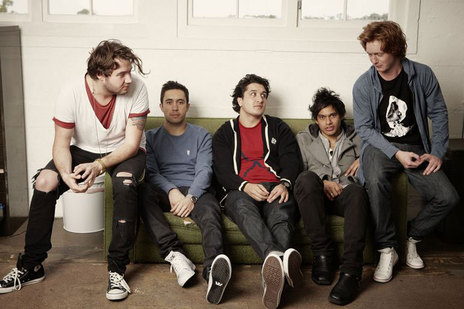
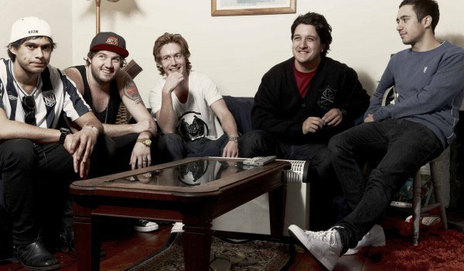
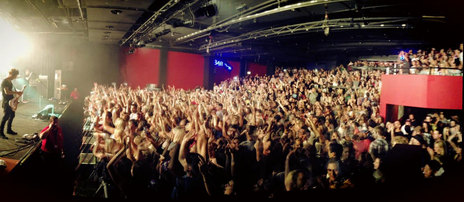
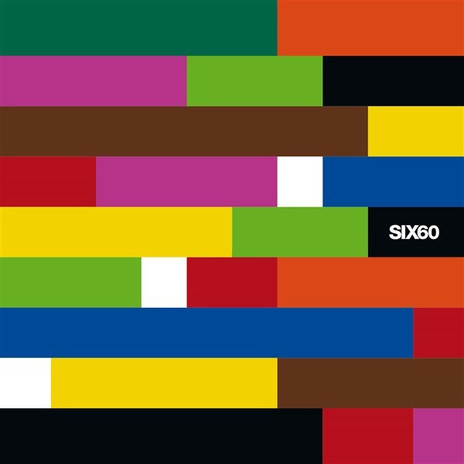
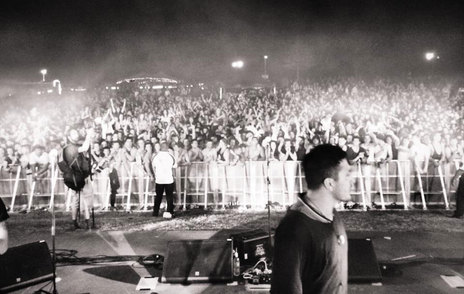
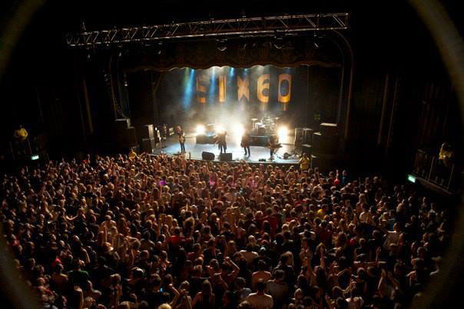
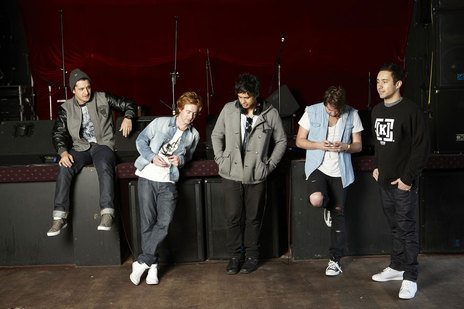
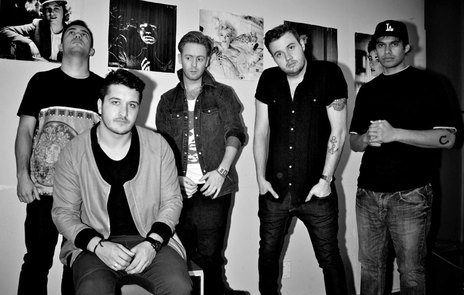
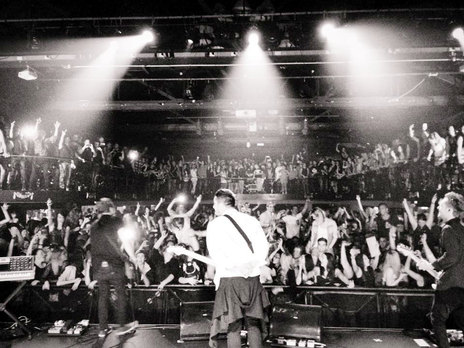
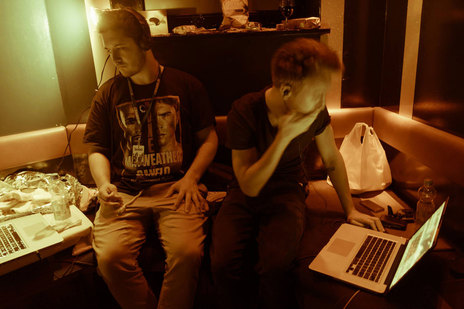
Eli Paewai - drums
Chris Mac - bass, synthesiser
Ji Fraser - guitar
Marlon Gerbes - synthesiser, samples
Matiu Walters - vocals, guitar
Universal
Sony
Columbia Four Music
Massive Entertainment
Visit our sister site
NZ On ScreenMade with funding from
NZ On Air